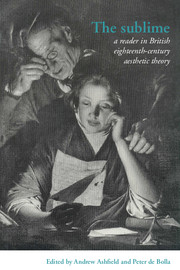Book contents
- Frontmatter
- Contents
- List of Abbreviations
- Introduction
- Part I The Longinian tradition
- Part II Rhapsody to rhetoric
- Part III Irish Perspectives
- Part IV The Aberdonian Enlightenment
- Part V Edinburgh and Glasgow
- Part VI From the Picturesque to the Political
- 41 A dissertation on oriental gardening (1772)
- 42 An essay on the picturesque (1794)
- 43 A review of The landscape (1795)
- 44 The history of the life of William Pitt, Earl of Chatham (1783)
- 45 Enquiry concerning political justice (1798)
- 46 Reflections on the revolution in France (1790)
- 47 A letter from the right honourable Edmund Burke to a noble lord (1796)
- 48 A vindication of the rights of man (1790)
- 49 Letters written in France (1790)
- 50 A tour in Switzerland (1798)
- Sources and further reading
48 - A vindication of the rights of man (1790)
Published online by Cambridge University Press: 05 June 2012
- Frontmatter
- Contents
- List of Abbreviations
- Introduction
- Part I The Longinian tradition
- Part II Rhapsody to rhetoric
- Part III Irish Perspectives
- Part IV The Aberdonian Enlightenment
- Part V Edinburgh and Glasgow
- Part VI From the Picturesque to the Political
- 41 A dissertation on oriental gardening (1772)
- 42 An essay on the picturesque (1794)
- 43 A review of The landscape (1795)
- 44 The history of the life of William Pitt, Earl of Chatham (1783)
- 45 Enquiry concerning political justice (1798)
- 46 Reflections on the revolution in France (1790)
- 47 A letter from the right honourable Edmund Burke to a noble lord (1796)
- 48 A vindication of the rights of man (1790)
- 49 Letters written in France (1790)
- 50 A tour in Switzerland (1798)
- Sources and further reading
Summary
Had you been in a philosophising mood, had your heart or your reason been at home, you might have been convinced, by ocular demonstration, that madness is only the absence of reason. – The ruling angel leaving its seat, wild anarchy ensues. You would have seen that the uncontrolled imagination often pursues the most regular course in its most daring flight; and that the eccentricities are boldly relieved when judgment no longer officiously arranges the sentiments, by bringing them to the test of principles. You would have seen every thing out of nature in that strange chaos of levity and ferocity, and of all sorts of follies jumbled together. You would have seen in that monstrous tragi-comic scene the most opposite passions necessarily succeed, and sometimes mix with each other in the mind; alternate contempt and indignation; alternate laughter and tears; alternate scorn and horror – This is a true picture of that chaotic state of mind, called madness; when reason gone, we know not where, the wild elements of passion clash, and all is horror and confusion. You might have heard the best turned conceits, flash following flash, and doubted whether the rhapsody was not eloquent, if it had not been delivered in an equivocal language, neither verse nor prose, if the sparkling periods had not stood alone, wanting force because they wanted concatenation.
It is a proverbial observation, that a very thin partition divides wit and madness.
- Type
- Chapter
- Information
- The SublimeA Reader in British Eighteenth-Century Aesthetic Theory, pp. 294 - 299Publisher: Cambridge University PressPrint publication year: 1996
- 16
- Cited by



